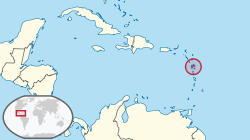| Guadeloupe parakeet | |
|---|---|
 | |
| Jean-Baptiste Labat's 1722 illustration of a Guadeloupe parakeet at the top right, with a Guadeloupe amazon to its left and a Lesser Antillean macaw below | |
| Scientific classification (disputed) | |
| Kingdom: | Animalia |
| Phylum: | Chordata |
| Class: | Aves |
| Order: | Psittaciformes |
| Family: | Psittacidae |
| Genus: | Psittacara |
| Species: | †P. labati |
| Binomial name | |
| †Psittacara labati (Rothschild, 1905) | |
 | |
| Location of the Guadeloupe region | |
The Guadeloupe parakeet (Psittacara labati) is a hypothetical extinct species of parrot that is thought to have been endemic to the Lesser Antillean island region of Guadeloupe.

